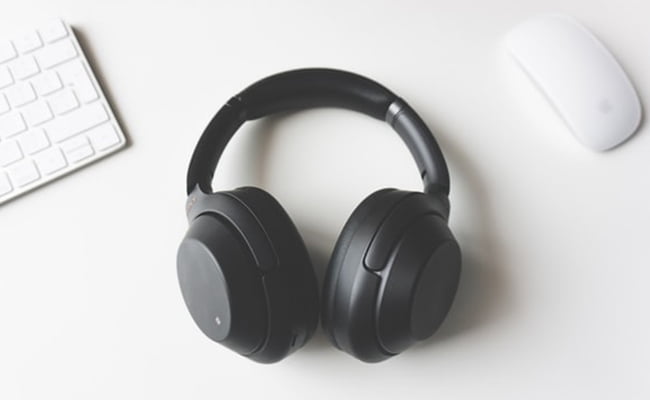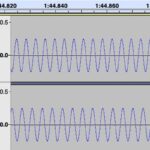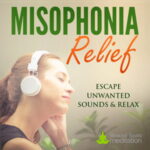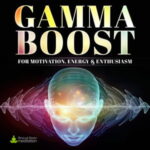For a while now people have speculated as to whether binaural beats work properly with noise cancelling headphones.
And even if they do, is there some negative impact on the frequencies involved?
A simple yes or no can answer this question. But to put your mind at rest, it is important to understand how this type of headphone works.
So let's look at the technology.

How Noise Cancelling Headphones Work
Noise cancelling headphones use active noise cancelling (ANC) to block out external low frequency noise.
It is important to note that it is external sound the headphones combat, not internal sound (the music going to your ears).
These headphones block out environmental noise pollution like traffic. They are ideal for airline travel, train travel, and open-plan offices where it is difficult to concentrate.
At higher frequencies, like the range of human conversation, NCH do very little if anything at all. They won't block out a baby crying or a car alarm, or fast and transient sounds like a door shutting.
ANC headphones use microphones to detect low frequency noise and, before it reaches your ear, they neutralize it by generating a combative sound.
Sounds strange, right? Combating sound with sound.
Well it's pretty clever.
It's achieved by using an acoustic phenomenon called phase cancellation, whereby two “out of phase” sounds cycle at an opposite of 180° and cancel each other out.
The microphone on the outside of the headphones has to detect the incoming sound and produce a sound that is 180° opposite to achieve cancellation.
Noise cancelling headphones turn down external sound by approximately 30 db. They are not perfect, but the technology has got more effective over the years.
They don’t create silence and don't eliminate all noise; they reduce noise and are most efficient at preventing low-frequency droning sounds such as hum.
And this is why people sometimes believe they will affect binaural beats.
Noise Cancelling & Binaural Beats
Binaural beats, particularly in the lower Theta and Delta ranges produce a low frequency hum-type sound. In our tracks, this hum (like a bass frequency) is felt below the musical overlay.
Because ANC headphones cancel out low frequency sound, people presume the binaural beats frequencies will be affected by the cancellation.
But as noted previously, the goal of noise cancelling headphones is to prevent external sound leaking into you headspace.
And since the music / binaural beats frequencies are coming through the headphones, they are not being detected by the microphone and remain unaffected.
However, on early model ANC headphones there may have been some leakage from the headphone speakers to the microphone that may have slightly affected the sound.
But the technology has come a long way in the last 20 years, and certainly a long way since the the 1950s when Dr Lawrence Jerome Fogel, an American pioneer of electrical and aerospace engineering, developed the concept to protect pilots’ hearing in the cockpit area.
A Positive Effect On Listening
The truth is that noise cancelling headphones can enhance your binaural beats listening experience.
When listening to binaural beats, particularly for meditation, relaxation and focus purposes, blocking out external distraction helps enhance the process of brainwave entrainment.
This is why we recommend closed-back headphones as opposed to open-back: because closed-back block out sound better and give you that “in-stage” listening experience.
So rather than negatively affecting the process, ANC phones can actually help.
Which Noise Cancelling Headphones Should You Buy?
We have experience with the Bose Quiet Comfort series and like the quality of these headphones. Indeed, we have heard from a number of our users who like this brand too.
But you can certainly buy different, less expensive brands, and new players are entering the market every year.
Mid-priced brands like Sony, Panasonic, JBL, Skullcandy, and Phillips all have models available that will work just fine.
However, you should consider that where Bluetooth is concerned, the lower the price may mean a compromise on quality.
Using Bluetooth for audio can mean a reduction in quality through the compression applied to the signal, and the codecs used for converting audio signals.
It really is down to the manufacturer to use the correct components and design to ensure minimal audio quality loss.
In theory, the brands selling more expensive models will have spent more on the build to ensure that audio quality loss is kept to a minimum.
That said, we all know you can end up paying a premium for a name.
The good news is that you can also buy wired noise cancelling headphones, and some that come with an option to use wired or Bluetooth.
The other good news is that rest assured, your binaural beats music will work effectively with your noise cancelling headphones.










This is good info, but not why I’m concerned about noise canceling headphones. I’m concerned due to the “canceling” sounds the headphones are playing for the phase cancelation, and whether those specific sounds are what will be affecting the binaural beats. Regular headphones play the binaural beats sounds without any other added sounds being played alongside them. The ANC headphones are playing the binaural beats frequencies AS WELL AS the “canceling” frequencies to combat the outside noise. Just wondering if hearing both of those simultaneously is less effective than just the binaurals.
Hi GH, I understand your concern. The noise-canceling signal does not add sound into your ears but instead subtracts external noise through phase cancellation. This process occurs before the sound reaches your ears and does not overlap or interfere with the frequencies used to generate binaural beats. ANC headphones process the cancellation externally, leaving the played audio (binaural beats, music, or other sounds) unaffected. The beats are played as they are, without being altered by the canceling mechanism
If you are still concerned you can always turn the ANC off. I think pretty much all noise-cancelling headphones have this feature.
Have great day!